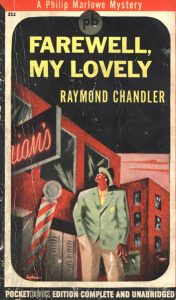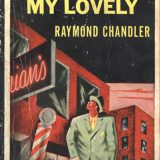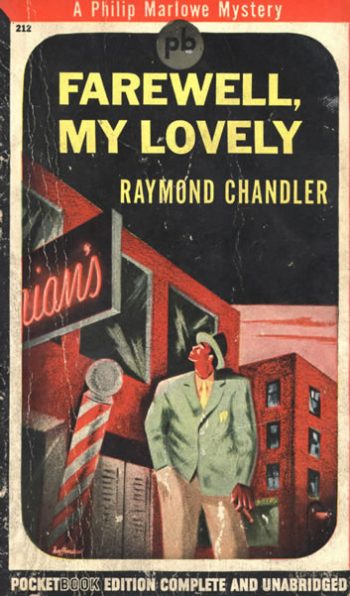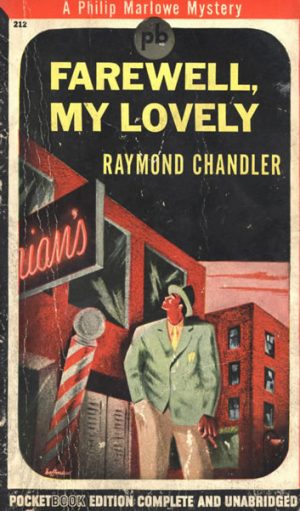Farewell, My Lovely – Raymond Chandler – 1940
Posted by Steven on 10/7/2012, 14:03:47
A great story told with a lot of clever, dry wit. I was struck by the contrast with Red Harvest, both in the way society is pictured and the general mood of the story. Farewell, My Lovely leans toward the soft-boiled, as there is an undercurrent of compassion and humanity that has no place in Red Harvest.
~
Posted by Sterling on 11/7/2012, 20:11:57, in reply to “Re: Farewell, My Lovely”
Haha, “soft-boiled,” I like that!
Hammett’s heroes tend to be ruthless, not only the Op, but Sam Spade as well. Even Nick Charles is a long way in the book from the cheerful sophisticate of the movies. I read somewhere that Chandler, although he admired Hammett, felt that Hammett never really cared for any of his characters. Chandler humanized the genre. Marlowe is likable, even admirable.
~
Posted by guillermo maynez on 17/7/2012, 21:11:38, in reply to “Re: Farewell, My Lovely”
***SPOILERS***
I liked it a lot, even better than “Red Harvest”. But there’s something I can’t understand: why is Velma interested in getting rid of everybody that knew her before she married the millionaire, if he knows everything about her past and has no problem with it? There seems to me to be no motive for her murdering Marriott and Malloy, her life is all settled and yes, Malloy might have been a nuisance, but not a danger. And what’s with the Sonderborg clinic, and the psychic, and all that stuff? Does anybody understand everything and can explain?
~
Posted by Sterling on 17/7/2012, 23:40:07, in reply to “Re: Farewell, My Lovely”
******SPOILERS******
Guillermo,
I think that we can take Hemingway’s explanation in Chapter 33 at face value as far as the Sonderborg clinic. (I love the Hemingway joke.) Similarly, most of the rest of the novel is wrapped up in Chapter 40 (which starts with Chandler using Anne to mock the wrap-up chapter).
As for Velma, she herself is incapable of love. She doesn’t understand it. Therefore, she assumes that Malloy will kill her for setting him up. She has always assumed he had figured it out, which he probably would have (he’s smarter than he first appears) if he were not blinded by love. When he finally does realize, she shoots him in terror. We know that Malloy would never have hurt her, but she does not. I believe hiding out from Malloy is the main reason that she must conceal her identity.
Chandler was famous for his elaborate plots. He often employs the technique he uses in FML of employing two apparently independent plots (Plot 1: Malloy, Velma, Mrs. Florian; Plot 2: Marriott, stolen jewels, Mrs. Grayle) and then starts to weave them together. But I, at least, do not read Chandler for the story as much as for the language and style. Chandler once said, “I live for syntax.” And he’s darn good with it, but most of us are struck primarily by his outrageous similes and metaphors. The “tarantula on a slice of angel food” is perhaps the most famous from FML. Check out this sentence: “She had pewter-colored hair set in a ruthless permanent, a hard beak, and large moist eyes with the sympathetic expression of wet stones.” That’s from The High Window. Great stuff.
~
Posted by Steven on 18/7/2012, 9:57:39, in reply to “Re: Farewell, My Lovely”
: ******SPOILERS******
I got the impression as well that the clinic, the fortune teller, and the gambling boat were all introduced to demonstrate that there was a vast, loosely connected, criminal underworld through which Marlowe had to navigate to get his answers. It wasn’t just a case of following THE trail to THE criminal, but determining WHICH trail and WHICH criminal was the right one. This adds to the moral ambiguity of the story, as Marlowe is not out to eliminate crime, just to carry out his assignment.
I had the impression that Velma was concealing her origins more to maintain her social standing, but fear of Malloy makes sense too.
I agree that the writing is more the attraction than the story itself.
~
Posted by Lale on 17/7/2012, 22:22:01, in reply to “Re: Farewell, My Lovely”
Sorry, two detective novels are too many for me. I read the Red Harvest, I simply can’t read another one, not so soon anyway.
~
Posted by Sterling on 17/7/2012, 23:12:37, in reply to “Re: Farewell, My Lovely”
I understand, Lale. It’s easy to get burned out (at least for me) if I start reading too many detective novels in a row. I hope sometime you’ll come back to Farewell, My Lovely, though. It’s much lighter than Red Harvest, and I think you’ll like it even better.
I’m not surprised that you were not up for De Niro’s Game. While I liked that novel quite a lot, it is very dark indeed.
It seems to me that Hammett was the father of two separate, though inter-related genres — the hard-boiled detective novel and the noir novel. It seem to me that they are entirely separate, although they are often confused. Chandler is the great example of the hard-boiled detective (or perhaps soft-boiled, as Steven put it). These novels all feature a detective as the protagonist, usually a private detective, but sometimes a loner police officer. (He can’t be a team player or the novel becomes a police procedural.) Generally, there are wisecracks and humor, although the tone is usually cynical.
The noir novel generally does not feature a detective. It is usually a story of crime and despair. The mood is always dark. There is rarely much humor, except perhaps gallows humor. James M. Cain is the most prominent example (The Postman Always Rings Twice; Double Indemnity). Often, though not always, the protagonist is led to his demise by a femme fatale. These dangerous ladies also turn up in detective novels, FML arguably features one, but usually their wicked snares fail to trap the hero.
I’ve always thought that James M. Cain (in the 40’s) and Jim Thompson (in the 50’s) were the beat noir writers, but I’ve just purchased the Library of America’s collection of five novels by David Goodis. (In these genres, only Hammett and Chandler have previously been honored by being selected for publication by the LofA). I look forward to reading them (although probably not several in a row).
I am currently making my way through a much earlier crime novel, Les Miserables, which somehow I have never read before. In fact, I find myself to be very deficient in my reading of the 19th century French novel, except Flaubert. I’m looking to remedy that.
~
Posted by Steven on 18/7/2012, 9:44:58, in reply to “Re: Farewell, My Lovely”
There are some interesting articles in Wikipedia under “Crime Fiction” and “Detective Fiction” that offer various classification schemes. To build upon Sterling’s taxonomy, it seems to me that the bulk of crime fiction novels–at least those we read for their literary value–fall into three broad categories: The English “whodunit” (Christie, Sayers, etc.), plus the mostly American “hard-boiled detective” and “noir fiction” as Sterling described them.
I rarely like to read more than two books in a row by the same author or of the same genre. There are plenty of people who are just the opposite. My wife, for example, will fix on a particular author and read every one of his or her books back to back. She’s just finished reading 14 books in a row by Kathy Reichs. (They are about a police forensics expert, and I think they would fall in the “whodunit” group.)
I’m about to read one of the whodunits: And Then There Were None by Agatha Christie. This is completely unplanned. There is a needy family my wife helps out by providing all of the children’s schools supplies, uniforms, and books for summer reading. One of the kids has to read And Then There Were None. I have a copy, so instead of buying him a new one, I’m going to read my copy quickly so I can just give it to him. (It surprised me that this was chosen as a school assignment considering that it’s original title was “Ten Little Niggers.”) I’ll also be reading The Alchemist by Paolo Coelho before giving my copy the older child.
~
Posted by Sterling on 19/7/2012, 0:37:08, in reply to “Re: Farewell, My Lovely”
If you will read one (but only one) detective novel, I strongly recommend Chandler. Warmth and humanity run just beneath the surface in his novels. (And sometimes on the surface. Remember the “little pink bug”?) A case may be made for Hammett as literature as a case may be made for Wilkie Collins. Chandler, however, is routinely listed among the best American novelists of the twentieth century. I recommended Farewell, My Lovely because it is fun and was Chandler’s own favorite among his novels. However, if you want to really understand why he is so highly regarded, his deepest work of fiction is surely The Long Goodbye. Anthony Burgess said that despite the critics who refuse to believe that a detective novelist can be considered of the first rank, Chandler is “a serious writer” and “an original stylist.” Further, he wrote, “The Long Goodbye is beautifully composed with a taut, economical style exactly suited to the narrator Marlowe. If this is not literature, what is?”
I chose Red Harvest because it is the most ferocious and relentless of Hammett’s novels. It probably is a guy’s book. A woman might prefer The Thin Man or The Glass Key, but Hammett is never a warm writer. Chandler is different. Chandler’s novels are not just for guys. :^)
~
Posted by Steven on 19/7/2012, 21:57:11, in reply to “Re: Farewell, My Lovely”
: I’m about to read one of the whodunits: And Then There
: Were None by Agatha Christie.
Having now done so I’ll have to say that, even though I enjoyed it, I’m much more in favor of the hard boiled style of Hammett and Chandler. The Christie novel was a clever puzzle, but had none of the colorful dialog, characterization, or local flavor of the American writers.
~
Posted by guillermo maynez on 20/7/2012, 13:14:16, in reply to “Re: Farewell, My Lovely”
Well then, I was right in my thoughts about “Farewell, my Lovely”: it is worth reading for the literature itself. While I enjoyed “Red Harvest”, it was like reading an old movie. The Continental Op is witty and likable, but Marlowe is a much more tridimensional character. The “pink bug” episode is, for me, a key in the revelation of the humanity of the detective. It adds tons to the novel to assert that a man may be as tough and cold as he needs to be to survive in a hostile environment, without losing sight and feel of what makes us humans: a fundamental compassion and a deep understanding of other people’s motives, even when (especially when) we do not approve of their actions.
Plus, of course, the novel is so fun to read.
~
Posted by Steven on 21/7/2012, 8:43:56, in reply to “Re: Farewell, My Lovely”
: but Marlowe is a
: much more tridimensional character.
Here is one good quote:
“A lovely old woman. I liked being with her. I liked getting her drunk for my own sordid purposes. I was a swell guy. I enjoyed being me. You find almost anything under your hand in my business, but I was beginning to be a little sick at my stomach.”
And much later, on his way to the gambling boat, he says simply:
“‘I’m scared,’ I said suddenly. ‘I’m scared stiff.'”
There are plenty of hints dropped that Marlowe is a surprisingly well-educated, or at least well-read, man for someone in his profession. I wonder if his background comes out in any of the other novels. I’ve only read The Big Sleep, and don’t recall anything there. Sterling, do you know if Marlowe ever explains how he came to be a private eye?
~
Posted by Sterling on 21/7/2012, 20:59:42, in reply to “Re: Farewell, My Lovely”
Marlowe became a private eye after being fired for insubordination as an investigator for the Los Angeles District Attorney’s Office. I agree that Marlowe appears better read and better educated than one might expect. The Hemingway joke is a good example. Even though Hemingway was a celebrity writer at the time, you still have to be interested in reading to know any writers. The cop he calls “Hemingway” does not get the Hemingway joke. (Which is kind of a joke in itself.)
I was curious, so I decided to read And Then There Were None, too. It’s hard to think of Christie and Hammett/Chandler on the same planet. In all fairness, Dame Agatha does not seem to be attempting “literature” at all. The book is like a puzzle and has approximately the same depth of characterization as a game of Clue. Everything is about, and only about, who did it and how he/she managed it. It’s very clever. I recently read The Murder of Roger Ackroyd, which is also clever. It is easy to see why Christie was and remains so popular. She was very good at what she did. In our continuing investigation of genre writing vs. literary writing, Christie is pure genre. The contrast to Chandler is striking.
~
Posted by guillermo maynez on 23/7/2012, 11:53:08, in reply to “Re: Farewell, My Lovely”
That´s why I have always thought that the Sherlock Holmes novels and stories go way beyond any “genre” and are true literature: because their magic is the creation of characters and indeed of a whole world, a distinctly Holmesian London and surrounding areas. There is a specific atmosphere, a mood, and an environment; in several stories, Holmes refuses to turn the culprit in, on account of the crime having been committed as a response against, say, family violence. The Holmes adventures have, of course, a strong element of “whodunnit”, but the emphasis is on the relationship between Holmes and Watson, and on human nature and its relation to human conduct and crime.
Marlowe here is also more a professional observer of humans, even when he is very competent as a private eye, than a simple bureaucrat trying to “solve” things and go home. That’s why he gets involved in the series of events that lead him to such nightmarish adventures: out of true curiosity. And he is not immune to the sordidness and at the same time the humanity of the whole affair.
~
Posted by Sterling on 23/7/2012, 22:07:52, in reply to “Re: Farewell, My Lovely”
I have a Complete Sherlock Holmes on my shelf, but honestly I haven’t read a Sherlock Holmes story in years. Even so, I agree that Sherlock Holmes is one of the most recognizable, indelible figures in all literature. Although Doyle’s Holmes stories are indeed “whodunnits,” there is more going on than the puzzle. Judging by the two Christies I have recently read, there is really nothing to them besides the puzzle.
If you are the sort of person who likes to “match wits” with the author and see if you can discover the murderer before the detective, I can see how one might enjoy the work of Christie and the other writers of that school. However, both Doyle and Chandler can be read for pleasure without really caring about the mystery. I don’t think that can be said of Christie.
~
Posted by Steven on 24/7/2012, 7:29:01, in reply to “Re: Farewell, My Lovely”
Well put and, having read much of Sherlock Holmes in recent years, I couldn’t agree more.

- Related:
- Book Reviews
















